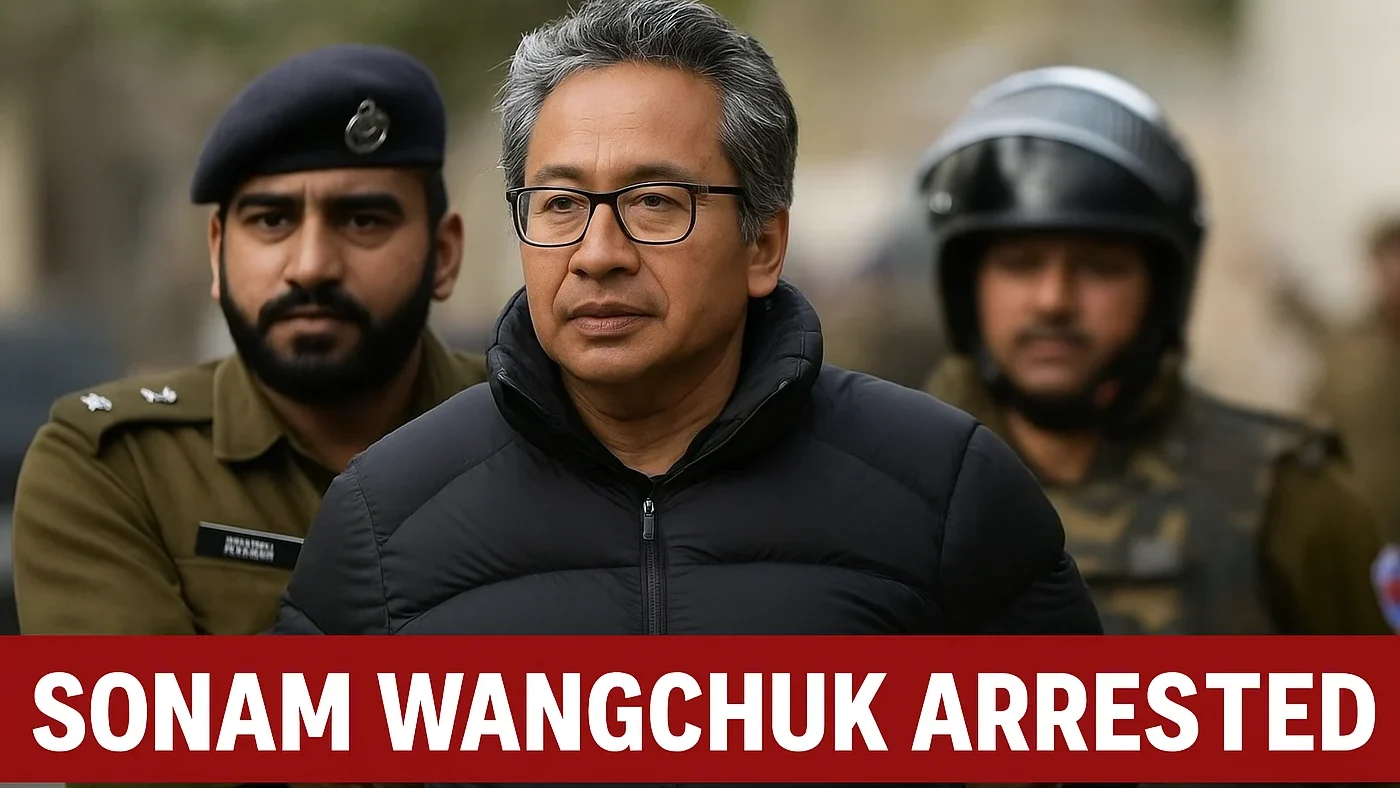Sonam Wangchuk arrest
Ladakh has been simmering for weeks, but the situation reached a breaking point this week. On Friday afternoon, renowned climate activist Sonam Wangchuk was arrested in Leh, two days after violent clashes erupted over demands for statehood and constitutional protections under the Sixth Schedule.

Officials confirmed that a police team led by Ladakh DGP S. D. Singh Jamwal took Wangchuk into custody at around 2:30 pm. The arrest follows the Union home ministry’s decision to cancel his NGO’s foreign funding license just a day earlier.
The arrest marks the latest escalation in a movement that has spiraled from peaceful hunger strikes to full-blown unrest across the Union Territory.
What Sparked the Violence? Ladakh protest
The flashpoint came earlier this week when two elderly hunger strikers—Tsering Angchuk (72) and Tashi Dolma (60)—collapsed after 35 days of fasting to demand statehood and constitutional safeguards for Ladakh. Their hospitalization late Tuesday night triggered a massive outpouring of anger among young supporters.
By Wednesday morning, thousands had gathered at Martyrs’ Ground in Leh, chanting for action. What began as solidarity protests soon turned into violent clashes.
- Four people were killed, and over 80 injured, including at least 22 police personnel.
- Protesters torched vehicles, attacked police vans, and clashed with security forces.
- Authorities responded with teargas shells and even live fire to disperse crowds.
- A curfew was quickly imposed across Leh, and restrictions on gatherings remain in place.
Wangchuk’s Arrest and the Charges
The arrest of Sonam Wangchuk, known globally for his climate activism and educational reforms, has shocked many. Authorities have not disclosed the exact charges, but his detention follows a sweeping investigation into alleged financial irregularities and foreign funding violations.
On Thursday, the Union Home Ministry cancelled the FCRA (Foreign Contribution Regulation Act) license of Wangchuk’s NGO, Students’ Educational and Cultural Movement of Ladakh (SECMOL). Officials accuse him of:
- Depositing local funds into the NGO’s FCRA account—a violation of rules.
- Diverting funds for activities outside the approved scope, including research on “the country’s sovereignty.”
- Failing to deposit foreign funds into the designated FCRA account.
Investigators claim that even Wangchuk’s other initiative, the Himalayan Institute of Alternatives Ladakh (HIAL), received over ₹1.5 crore in foreign remittances without proper registration.
Allegations of Money Diversion
Sources allege a complex financial web surrounding Wangchuk’s work:
- ₹6.5 crore was allegedly moved to Sheshyon Innovation, a private firm linked to Wangchuk.
- Between 2018 and 2024, he allegedly received ₹1.68 crore in foreign funds across various accounts.
- Officials say he maintained nine personal bank accounts, eight of which were undeclared.
- HIAL allegedly has seven accounts, four not declared; SECMOL has nine, with six undeclared.
A senior official claimed Wangchuk received “huge CSR funds from corporates, including PSUs, while publicly criticizing them.”
Government Response and Investigations
The Home Ministry has attributed Wednesday’s mob violence to what it called “provocative speeches” by Wangchuk, including references to Arab Spring–style uprisings and youth movements in Nepal.
The CBI is now investigating the alleged foreign funding violations.
Income Tax authorities are probing other potential financial irregularities.
Wangchuk, however, insists the charges are politically motivated. He has accused the government of “building a case to put me behind bars.”
From Peaceful Ladakh protest to Chaos
Wangchuk, celebrated worldwide for his work in sustainable technology and education, had been on a hunger strike for statehood and Sixth Schedule safeguards before calling it off when fellow protesters were hospitalized.
Initially, his movement was marked by non-violent sit-ins and fasts, echoing Gandhian methods. But after Tuesday’s medical emergency, protests spiraled.
In an online message, Wangchuk acknowledged that young people were growing increasingly frustrated because their peaceful demonstrations weren’t bringing any concrete outcomes. He said the hospitalization of his fellow hunger strikers became the flashpoint that turned a peaceful campaign into one of Ladakh’s worst days of Ladakh violence in decades.
Curfew and Security Lockdown
The Union Territory administration has imposed strict curfews across Leh district. Internet services have been restricted in some areas to curb the spread of misinformation. Security forces remain deployed in large numbers.
Lt. Governor Kavinder Gupta has promised a “full investigation” and “stern action” against those responsible for the violence. He expressed condolences to the families of those who died and urged residents to remain calm.
Political Reactions Ladakh protest
The developments have sparked intense political debate:
Local groups like the Leh Apex Body (LAB) and the Kargil Democratic Alliance (KDA), which have long campaigned for statehood, accused the Centre of ignoring legitimate demands.
Opposition leaders have questioned the government’s heavy-handed approach, calling for dialogue instead of force.
Meanwhile, the Centre maintains that law and order must come first and that financial improprieties cannot be ignored.
Who Is Sonam Wangchuk?
Sonam Wangchuk is not just any activist. The engineer-turned-education reformer inspired the character of Phunsukh Wangdu in the Bollywood hit 3 Idiots. His work in sustainable development, including the famous ice stupas that provide water to Himalayan villages, has earned him international recognition.
That such a figure now faces serious financial and legal allegations underscores the gravity of the government’s case—and the volatility of Ladakh’s political climate.
The Bigger Picture: Ladakh statehood demand
The unrest centers on a long-standing demand:
- The demand centers on granting Ladakh full statehood, a region that was turned into a Union Territory following the removal of Article 370 in 2019.
- Protesters are also seeking Ladakh’s inclusion in the Sixth Schedule of the Constitution, a provision designed to safeguard the rights and culture of India’s tribal communities.
Despite multiple rounds of talks with the Union government, no agreement has been reached, fueling frustration among locals who fear exploitation of Ladakh’s fragile environment and unique culture.
What Happens Next?
With Sonam Wangchuk in custody, investigations into alleged financial misconduct underway, and Ladakh under curfew, the immediate future looks tense.
The CBI and Income Tax probes are expected to continue for weeks.
Local groups are calling for renewed peaceful protests and demanding that the Centre advance the next round of talks.
- The Union government has appealed for calm, but many fear further unrest if dialogue stalls.
Key Takeaways Sonam Wangchuk arrest
- Sonam Wangchuk arrest in Leh after violent Ladakh protest demanding statehood and constitutional safeguards.
- Four people killed, over 80 injured in the worst violence Ladakh has seen in decades.
- Government cancels his NGO’s FCRA license, citing serious financial irregularities.
- CBI and Income Tax investigations launched into alleged fund diversion and undeclared accounts.
- Curfew and heavy security remain in place across Leh as political tensions rise.
The arrest of Sonam Wangchuk arrest marks a pivotal moment for Ladakh. What began as a peaceful push for constitutional rights has now become a test of how India balances national security, environmental activism, and the democratic right to protest. The world will be watching as this remote Himalayan region navigates its most volatile chapter in decades.









